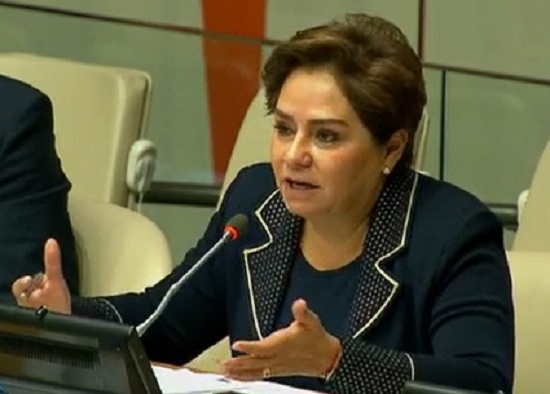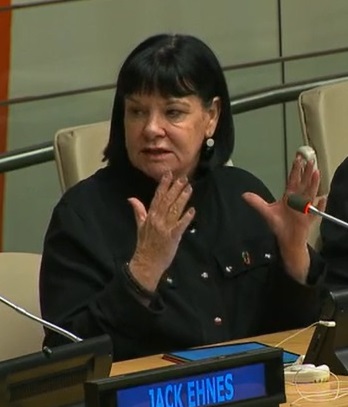Join our LinkedIn group to discuss this article. You may also email the author directly using our contact form.
Climate Investors Dialogue with the Labor Movement


United Nations Framework Convention
on Climate Change, discusses plans for 2018.
(Credit: UN Web TV and Kat Friedrich)
The focus of business leaders shifted toward new horizons on Jan. 31 at the Investor Summit on Climate Risk in New York City. These included the role of organized labor in the global energy transition. This was the first conference session Clean Energy Finance Forum has covered where labor issues were discussed at length.
Collaboration with organized labor was discussed at this conference as a core part of a ‘just transition’ for coal-mining communities. Very few nations are dialoguing proactively about how to transition the fossil fuel workforce to new technologies.
This transition is key to successful implementation of the Paris Agreement. 174 countries have signed the Paris Agreement so far, according to Patricia Espinosa, executive secretary of the United Nations Framework Convention on Climate Change.
“I have referred to this year as Paris 2.0,” Espinosa said. “By December this year at COP24 in Poland, we need to finalize what we call the Paris Agreement work program to make it operational.”
Espinosa is hard at work making the Paris Agreement take root and build momentum. “Without having a good outcome this year, Paris remains just an agreement. The Paris Agreement is a fantastic framework. It really guides the process – not only on climate change, but on development.”
Throughout this year leading up to COP24, stakeholders will be sharing their successes and failures via an online platform the United Nations has set up, Espinosa said. There will be an additional negotiation in the early fall. In September, a summit will take place in California.
Building trust, Espinosa said, is key to bringing the results to fruition. “One element to be able to build that trust is financing.” Governments need to know financiers will deliver on their private-sector commitments.
In addition to dialogue between the private and public sectors, collaboration between businesses and labor unions is critical in facilitating the transition toward cleaner energy.
Reshaping the Coal Economy
“As we’re moving away from fossil fuels, there are fewer than four countries in the world talking to their workers and employers in the coal sector about an orderly exit,” said Sharan Burrow, general secretary of the International Trade Union Confederation. “That’s a disgrace. And so your work is critical. If we don’t get that right in fossil fuels, we’re going to leave a lot of stranded workers and communities.”
Jobs in the coal industry have been a controversial topic of discussion in the United States for years, with the Trump administration taking a stand repeatedly that these jobs should be preserved. This includes the recent federal budget proposal to support the fossil fuel industry while undercutting renewable energy support.
“If we lose the trust of communities and workers, we’ll get more of the ‘Let’s stop the war on beautiful, clean coal’ stuff,” Burrow said.

International Trade Union Confederation,
described what a 'just transition' is.
(Credit: UN Web TV and Kat Friedrich)
Planning a Safe Transition
What can be done to maintain jobs in coal-producing areas while transitioning over to new energy sources? Burrow said she recommends that coal companies take responsibility for engineering a smooth transition for the local workforce.
This is often different from how companies behave. Frequently, when a company shuts down operations in a town, it does not create a workforce transition plan. There are many ghost towns that remain after the departures of various industries.
“We prefer it when companies are committed to transition,” Burrow said. “If you take a company like Enel, for example, which is from Italy but is investing in big Midwest wind jobs in the United States, we say to them that they’re doing a terrific job of managing the phase-out. They don’t walk away from their coal-fired-power-station communities – they either reinvest in them in renewables or [start] industry parks or partnership operations.”
But in this situation, communities may experience a decline in unionized jobs. This can lower their standard of living.
In Enel’s situation, Burrow said, “We are seeing, I’m sorry to say, lower wages and not quite union-standard jobs.”
This problem is common. To resolve it, Burrow said she recommends that investors speak up and set expectations for companies to create ‘just transition’ plans.
Setting Investment Expectations
“We need to make sure investors are putting a floor of minimum standards,” Burrow said. “It’s a pretty simple recipe, really. If people are paid a minimum living wage and they know they can organize freely and bargain collectively for a share of the profits and productivity and have secure pensions, that’s really it.”
“If you’re not a climate investor, you’re fundamentally not doing your job,” said Brian Deese, global head of sustainable investing at Blackrock.
Mindy Lubber, president and CEO of Ceres, said that in the 15 years since Ceres hosted the first of these conferences, investors have developed a stronger commitment to the transition toward sustainability. “Investors have moved the frame from a climate frame to a capital markets frame.”
“Today, we’re introducing the investor agenda,” Lubber said. This includes investment, engagement, disclosure and policy. “If we’re to get to that below-2-degree world every scientist says we must have to live a habitable life, we’ve got to do more. We’ve got to keep ratcheting down investments in the highest-carbon fossil fuels. Beyond the Paris Agreement, we need you all to speak out about a price on carbon.”
“Climate presents perilous risks and boundless opportunities,” Lubber said. “Climate change is an existential threat. It is having a profound impact in our portfolios, our global economy, and our children.”
Transforming the Job Market
Investors’ role is crucial in transitioning workers to a clean energy economy, Burrow said. “I want to thank investors for doing everything they do. We see this as the biggest systemic shift in our economy ever. It’s not so much that there are new jobs, it’s that there are shifts in the tasks in the jobs that they will do.”
There are over 10 million jobs in the solar industry worldwide, Burrow said. This is projected to grow exponentially by 2025.
“This infrastructure spend will generate jobs,” Burrow said. “They have to be good jobs.”
Vulnerable workers watch the job market shifting. Burrow said that they are concerned about their pensions, skills and redeployment.
“We really need to put working people, their labor, their rights at the center of this transition. That’s why we talk about a just transition,” Burrow said. “We’re not pessimistic about jobs if we get it right. We want to see the lens of jobs and just transition. You cannot have this transition without the floor of worker’s rights, the just wages that have been denied to workers, the skills and education, and the support for redeployment. If we get that right, I’m an optimist.”
Guiding the Private Sector
What can companies do to respond proactively to these issues related to the transition toward renewable energy?
“We have a very simple set of propositions around investor principles,” Burrow said. “We ask companies, first of all, to disclose where they invest. We ask for a commitment to see there are corporate plans for the consequences of climate change consistent with the Paris 2-degrees commitment or less.”
Second, she asks that companies make plans for a just transition. “Our third principle is about the United Nations human rights and due-diligence commitments. The fourth one is about responsibility.”
“Companies and labor unions need to work together. When you put workers at the table, you build trust around the agreement,” Burrow said.
“We are the first generation to feel the impacts of climate change and we are the last generation that can do something about it,” Lubber said. “Let’s get to work.”